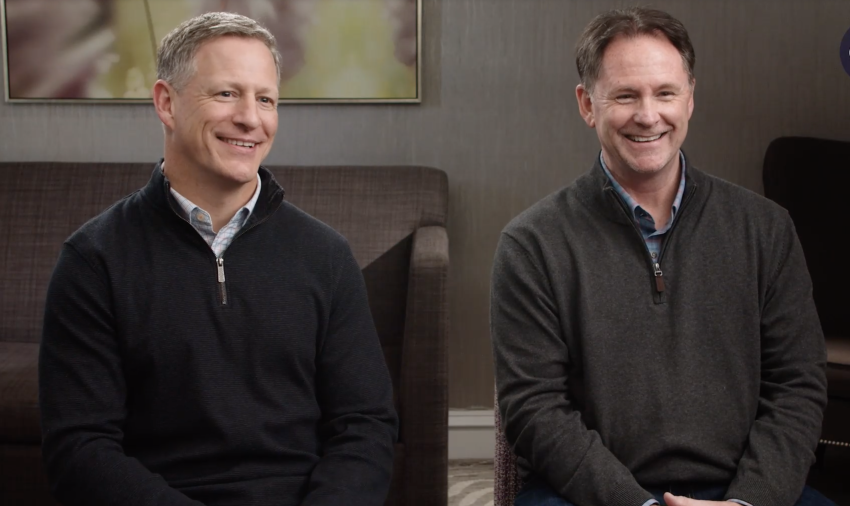Prophecy Pros podcasters help Christians understand End Times, eschatology in new book

Prophecy Pros podcasters Todd Hampson and Jeff Kinley, known for their thoughtful, biblically-sound views on hot-button issues like the End Times, have released a book detailing the answers to 100 questions on the foundations of biblical eschatology.
The book, titled The Illustrated Guide to Tough Questions About the End Times, was written based on information shared on their podcast.
The two podcasters told The Christian Post they conducted extensive research to answer the questions, combing through biblical history and difficult passages of Scripture.
“Todd and I, through Harvest House Publishers, started a podcast called the Prophecy Pros and it just blew up, just like reaching hundreds of countries, hundreds of thousands of downloads. We said, 'We need to get this in book form to people,’” Kinley, a bestselling author and speaker, said.
“We took a lot of the basic tenets of eschatology — the study of the End Times — and put those into a format of 10 major questions, or 10 major categories, and then we had 10 questions underneath this, and basically, it added up to 100 questions,” Kinley added.
The book features charts and illustrations to help readers understand the content discussed within its pages, according to Hampson, who is an author, illustrator and animation producer.
“I spent a lot of the time in all my books drawing things that make the concept more simple,” said Hampson.
“We find that most people are visual learners. They love to see easy-to-understand charts and sometimes comical things and other visual elements that we put in there that just draw the reader in and make it a little more accessible. It’s an intimidating topic, so we wanted to make it as easy as possible for anyone to understand,” he continued.
The duo shared that they receive a slew of email inquiries from podcast listeners asking them to break down difficult topics such as the Rapture, the Second Coming, prophecy and more.
Such questions, they said, are nothing new to the Body of Christ.
“Even in the first century, you’ve got the apostle Paul writing several epistles, because the believers were confused about where they were on God’s timetable," Kinley contended. "So, particularly in 2nd Thessalonians, you've got disciples [where] it says their faith was disturbed and shaken and were upset about it because false teachers had come into the Church."
The Prophecy Pros break down the questions they receive into terminology that is easily digestible for the average Chrsitian, helping them read through books like Revelations and Daniel.
“How to discern the times with all that’s going on in the world now, that’s a really pertinent question,” said Kinley. “Believers and unbelievers alike are saying, 'Is this the end of the world? What’s going to happen and does God say anything about this?’ And so, we are pointing them to Scripture to help them out with that.”
“There’s an apologetic nature to it as well. We point to all the Old Testament prophecies that were fulfilled literally. So that’s a great apologetic to tell that only God can tell history in advance and have it happen exactly as He said it’s going to happen,” Hampson added.
The two authors said they believe that every biblical prophecy will happen in ways that the human mind will be able to eventually comprehend.
“Personally, me coming to Christ, one of the key things was looking at the apologetic Bible fulfilled prophecy,” Hampson recounted. “I thought that the Bible was a book of fairytales. I believed in evolution, all the nine yards. [I] grew up unchurched.”
He said that as a teen, he attended a Christian school where his art teacher also was his Bible instructor. His Bible instructor took the time to explain to him why the Bible could be seen as believable, which he said sparked his interest in reading more. The teacher, Hampson said, helped shape his understanding, and he begin viewing the Bible as a “supernatural book.”
“[That teacher] kind of took a liking to me, and really realized I was that unchurched kid in school. And he really went out of his way to show me: ‘No, you can trust the Bible because look at these hundreds of fulfilled Bible prophecies fulfilled in history,’” Hampson recalled, adding that that sparked in him a love for eschatology.
Hampson and Kinley agreed that Bible prophecy is an endless topic that humans have only just “scratched the surface” of uncovering because there’s a lot more to learn.
Typically, Kinley said, many people will use news headlines as a template by looking for something in the Bible that matches the stories. This can lead to speculation and sensationalism when it comes to prophesy, he said.
"People try to set dates of when Jesus is coming back,” Kinley said. “We want to reject all that and say, ‘What does the Bible really say?’ We tell people to first know your Bible, and then, once you know the Bible, you’re able to read the times that are around you."
Once a person is more familiarized with what the Bible has to say on eschatology, Kinley said, they will be less frightened by current events, such as Russia’s invasion of Ukraine and the COVID-19 pandemic.
Kinley said it's common for people to jump to conclusions about what prophecies are being fulfilled from those world happenings, but stressed that he and Hampson do not believe anyone, including themselves, should make certain predictions on End Times.
“We tell people to obviously go to trusted sources that you know. But, the Scripture is really the bedrock of what we say you should study on this thing,” Kinley said.
“I think this really gives people a sense of clarity in the fog. It gives them a sense of confidence that this is coming from God’s Word. And it gives them hope. To me, that’s the most important thing that people need right now, is a sense of hope that’s found in Christ and the confidence that’s found in the Scriptures,” he added.
Hampson stressed that readers need to "let Scripture speak" instead of pouring their own thoughts into it.
“Jesus Himself said, ‘No man knows the day or the hour.’ So, why do people keep picking date after date? After a while, it’s almost like the chicken little syndrome. We have been hearing about this forever,” he added.
Oftentimes, Hampson said, the Church tends to ignore the topic of eschatology. Though certain passages of the Bible can be difficult or scary, he said it's not helpful for Christians to avoid reading the book of Revelation, for example.
“Unfortunately, the Church at large has thrown the baby out with the bathwater and they are missing part of the Bible. God could have ended the Bible any way He wanted to, and there’s a book of prophecy about our glorious future and how it’s all going to end and it just gives hope and joy,” Hampson said.
“No one would go to their favorite movie and walk out before the ending. But, that’s what a lot of believers are doing when they skip reading the last book of the Bible. The entire Bible is one narrative. It’s all tied together. It’s all pointing in that direction. So, why would people read the whole narrative and just skip the ending. It really doesn’t make sense,” he said.
The devil has done a “great job” at trying to get people’s eyes off of reading the entire Bible and gaining insight into the foundations of Scripture, according to Hampson.
“What everyone wants to know is their origins and why they are the way they are, and where are we going, what’s our destiny and what does God have for us and what is our glorious future, the culmination of all the promises of our salvation?” Hampson said.
When addressing the idea of false teachers, which tends to be an issue when dealing with the topic of eschatology, Kinley pointed to 1 John 4:1.
“We are to ‘test the spirits to see if they are from God,’” he said quoting the Scripture. “As you read through the New Testament and even the Old Testament, what we find is that people were able to calibrate whether or not somebody was a true prophet, whether or not their prophecy actually came true,” Kinley said.
“And when it comes to the New Testament, God tells us to be discerning. He tells us to be aware. In fact, most of Paul’s epistles were written because believers were believing incorrect doctrine brought on by false teachers,” he added.
Studying the New Testament and finding out about the Scriptures is vital, Kinley noted, in order for a Christian to avoid being led astray by false teachers.
“The best way to do that is to really be familiar with the Bible and to get into the Word,” he said. “The more we’re literate with the Scriptures, the more we have that confidence and we find that we get in the Word and the Word gets in us.”
Leah Klett contributed to this report.



























